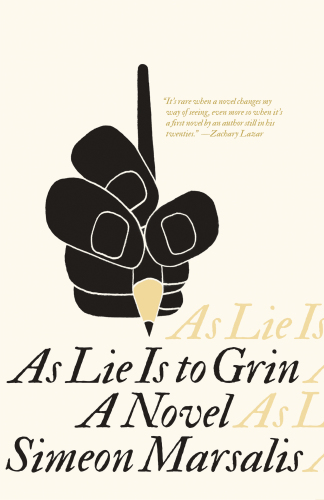
As Lie Is to Grin
A Novel
- اطلاعات
- نقد و بررسی
- دیدگاه کاربران
نقد و بررسی

August 7, 2017
Presented as a combination of diary entries and fragments from a novel within the narrative, Marsalis’s slim, ambitious debut tackles loss and racial identity. The protagonist, David, transitions from living on Long Island with his single mother to his freshman year as a black student at the predominantly white University of Vermont. He has recently broken up with his girlfriend, Melody; their relationship was built on a pair of lies—that his mother was a drug addict, and that he lived in Harlem—that also influence a semiautobiographical novel that he attempts to write. In Vermont, David becomes interested in the work and life of Harlem Renaissance writer Jean Toomer, particularly the author’s 1923 novel Cane and his resistance to being labeled by race. On campus, David sees and begins to follow a young man dressed in a gray suit, who may or may not be real, and who may provide a link to Melody’s grandfather, who attended UVM and “passed” as white. As racial guilt and confusion cause David to unravel, Marsalis incisively comments on a wide range of ideas, from authenticity to architecture.

October 15, 2017
Newcomer Marsalis blends diary extracts and novel excerpts to good effect, telling the story of University of Vermont freshman David as he struggles to clarify his African American identity at a mostly white school and to maintain the lie he told his New York girlfriend Melody: that he lives with his drug-addicted mother in Harlem, when in fact she's an educated professional who's nevertheless "crazy like black crazy." As he becomes increasingly interested in his heritage, David begins studying the work of Harlem Renaissance writer Jean Toomer and tracking down information connecting his school to African American history, though what's really telling is how hard he finds it to get straight answers. Melody's grandfather also attended the school, passing as white, and David sometimes imagines seeing a figure representing him or Toomer stalking the campus. Marsalis beautifully captures David's uncertainty and keen awareness of the world around him (the descriptions of architecture are both effective and key to the story), and it's a sign of the author's fine skills with narrative that the selected extracts and excerpts are strikingly different in tone, though David's life directly feeds his writing experience. VERDICT Short-listed for the 2017 Center for Fiction First Novel Prize, this affecting and unaffected story is for all readers.
Copyright 2017 Library Journal, LLC Used with permission.

September 15, 2017
A freshman at the University of Vermont, David notices early on in Marsalis' debut that from afar the the campus seemed to be encircled by a translucent bubble. He blinks; the bubble remains. Not finding connections at the 90-percent-white school beyond the kids who assume he smokes weed, David pores over the university's architecture, historical records, and disturbing racial legacies. He has another repeating vision, of a man in a gray suit. Before college, David met Melody at a Hamptons carnival and fatefully fibbed that he lived in Harlem with his mom, an addict. Melody and her father insist on offering David help and meeting his mom, propositions that leave him uncomfortable and questioning. As the years unfold, David inserts chapters of the novel he's been writing and tries to reach back and get it, to find whatever he can from his past that will help him move forward. With a title borrowed from Paul Laurence Dunbar We wear the mask that grins and lies Marsalis' deep and creative coming-of-age tale confronts race and omitted history. An exciting, thought-provoking debut.(Reprinted with permission of Booklist, copyright 2017, American Library Association.)




دیدگاه کاربران